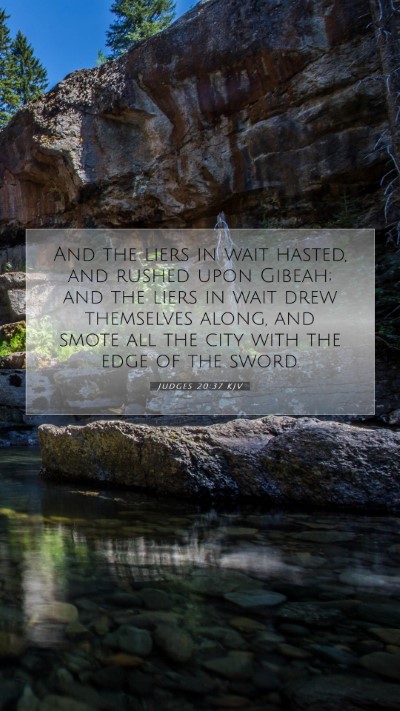Understanding Judges 20:37
The verse Judges 20:37 presents a critical moment in the narrative of the Israelite conflict. In this passage, the children of Israel employ a deceptive strategy against the tribe of Benjamin during a time of civil strife, which leads to significant consequences for all involved. To better understand this verse, we look towards various public domain commentaries including those of Matthew Henry, Albert Barnes, and Adam Clarke, providing a comprehensive analysis of its meaning.
Bible Verse Meaning
Judges 20:37 reads: "But Benjamin said, they are defeated before us, as at the first. But the Israelites said, Let us flee, and draw them from the city. And they fled." This verse captures a tactical maneuver employed by the Israelites as they seek to outsmart the Benjamites.
Insight from Commentaries
-
Matthew Henry:
Henry emphasizes the importance of strategy in warfare and the psychological aspects of battle. Here, the Israelites feigned retreat to lure the Benjamites out of the city, which highlights themes of cunning and the moral challenges of warfare. He reflects on the immediate consequences of this strategy, which would lead to devastating losses for the Benjamites.
-
Albert Barnes:
Barnes underscores the significance of this tactical deception in the broader context of Israel's civil war. He points out that the act of retreat was a deliberate tactic that showcased the cunning of the Israelites. He also notes the tragic irony of this conflict, where such strategies led to betrayal among the tribes of Israel.
-
Adam Clarke:
Clarke discusses the historical and geographical context that shapes this narrative. He elaborates on the consequences of internal strife and how this moment serves as a lesson about unity and the perils of division among God's people. He also brings attention to the desperate circumstances faced by Israel, forcing them to employ such extreme measures.
Meaning and Application
In analyzing Judges 20:37, we recognize the verse's relevance both historically and morally. The Bible verse interpretations suggest that while strategic thinking is necessary in conflict, it also raises ethical questions regarding deceit and the impact of civil discord. This passage serves as a reminder of how personal and communal actions can spiral into larger conflicts.
Key Themes
-
Deception in Warfare:
The use of deception as a strategy signifies a complex moral dilemma faced by the Israelites. This brings about discussions on the ethics of warfare, particularly how far one might go to achieve victory.
-
Consequences of Civil Strife:
This event symbolizes the broader implications of division within the community of believers. The fallout from such divisions often leads to tragedy, reflecting the importance of unity and reconciliation.
-
Strategic Insights:
The passage reveals the necessity of wisdom in addressing conflicts, suggesting that sometimes retreat can lead to a more advantageous position in the long run.
Related Bible References
- Judges 20:28 - Discusses the role of the Lord and how spiritual guidance is sought in the midst of conflict.
- 1 Samuel 14:20 - Highlights another moment of strategic insight in battle, illustrating the need for divine direction.
- Romans 12:18 - Addresses the importance of living in peace with others, which is relevant in the context of conflict resolution.
Conclusion
The exploration of Judges 20:37, along with insights from respected commentaries, offers a multi-faceted understanding of this complex verse. By employing Bible study tools and engaging in online Bible studies, believers can further delve into the rich meanings of Scripture and enhance their Bible study insights.
Further Study Recommendations
- Bible study guides that focus specifically on the Book of Judges.
- Courses that explore Old Testament narratives and their theological implications.
- Lessons emphasizing strategic decision-making in Biblical texts.


